There is increasing demand for the cybersecurity professionals. This field has many takers. But, they really ask if coding skills are required. Do cyber security require coding?
The technical requirements for deciding the jobs in cybersecurity differ. Coding is without a doubt important, but it is not the single most important component to have.
Cybersecurity positions demand generation of code, understanding of network, and concepts of security. There is some requirement that one has to meet in order to work in the cybersecurity field, that is why it is important to know them. Technical requirements such as coding is also going to be discussed in this article that concern a career in cybersecurity.
Such professions are interesting and secure at the same time. They requiremultiple basic competencies, including coding, for instance. Knowledge about these requirements enables persons make the right career decisions in this promising discipline.
Key Takeaways
- Cybersecurity careers require a range of technical skills, including coding skills
- Coding skills are an important part of many cybersecurity careers
- The technical requirements for a career in cybersecurity can vary depending on the specific job and industry
- Understanding the technical requirements for a career in cybersecurity is essential for success in this field
• Cybersecurity is therefore an exciting career path which involves solving puzzles in a digital world and needs the following skills.
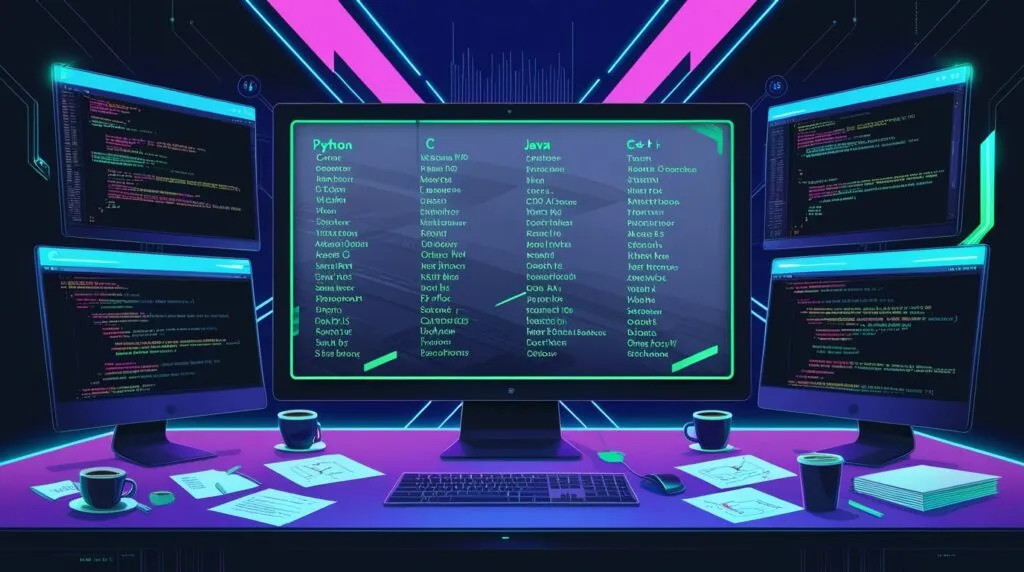
Understanding the Basics of Cybersecurity
Cybersecurity is vital in today’s digital world. It’s about keeping digital info and systems safe from harm. This includes network security, cryptography, and checking for threats.
There are many key areas in cybersecurity. These cover security checks, testing systems, and handling incidents. Knowing these areas helps people understand and protect their digital world.
What is cybersecurity?
Cyber security is simply the process of protecting information from vulnerability. It covers protection of risks, checking for possible vulnerabilities, and wait for security threats.
Key areas of cybersecurity work
Some important key areas in cybersecurity are:
- Security assessment and compliance
- Penetration testing and vulnerability assessment
- Incident response and disaster recovery
Common misconceptions about cybersecurity careers
Many think cybersecurity jobs are just about computers and coding. But, it’s a field that needs many skills. These include communication, problem-solving, and thinking critically.
Knowing the cybersecurity basics and key areas helps people protect their digital world. It’s also important to clear up misconceptions about cybersecurity jobs. This can help more people join this vital field.
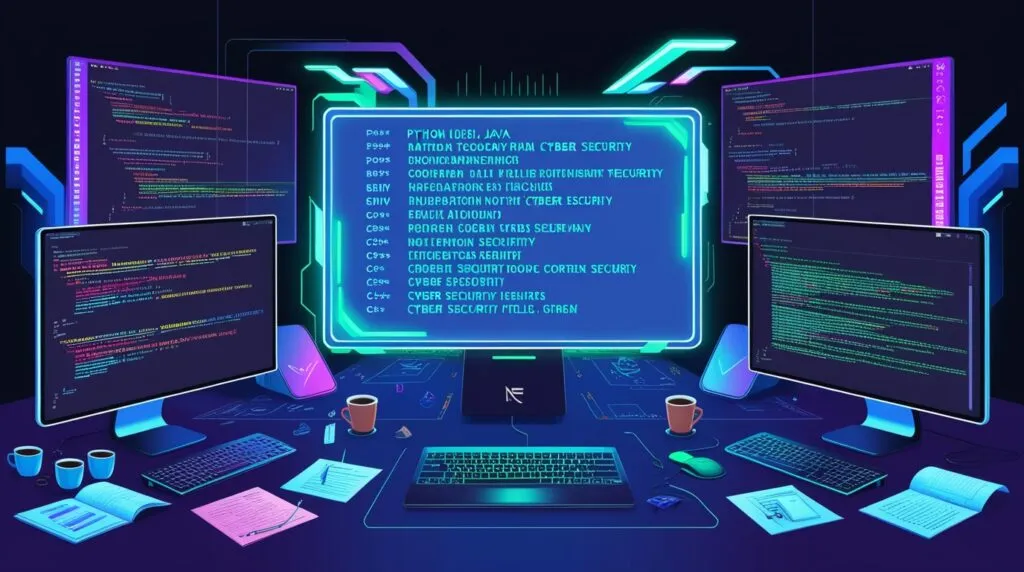
Do Cyber Security Require Coding: The Truth
Cybersecurity jobs don’t always need coding skills. While some roles, like penetration testing, require coding, others don’t. For example, security analysis and incident response might not need it.
In cybersecurity, technical skills are key, but they differ by job. A security analyst might know about networks and operating systems but not code. Yet, a penetration tester needs to know programming languages like Python or C++.
Here are some cybersecurity jobs and their coding needs:
- Security analyst: minimal coding skills required
- Penetration tester: advanced coding skills required
- Security architect: moderate coding skills required
- Incident response specialist: minimal coding skills required
In summary, coding is important for some jobs but not all. Knowing the coding requirements for each role is crucial. This helps individuals choose the right career path and develop needed technical skills.
The key to success in cybersecurity is a strong base in technical skills. Whether coding is needed or not, a career here is rewarding and challenging. Currently, there are many strengths and prospects that may be exploited for growth and development.
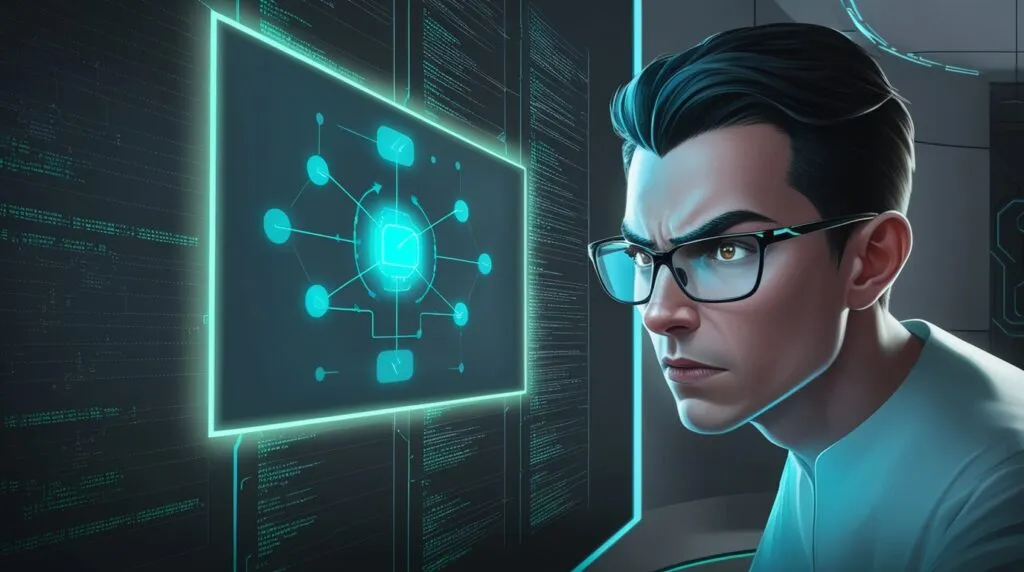
| Cybersecurity Job | Coding Requirements | Technical Skills |
| Security Analyst | Minimal | Network protocols, operating systems |
| Penetration Tester | Advanced | Programming languages (Python, C++) |
| Security Architect | Moderate | Network architecture, operating systems |
| Incident Response Specialist | Minimal | Network protocols, operating systems |
Different Roles in Cybersecurity and Their Technical Requirements
Cybersecurity has many roles, each with unique skills needed. Knowing these roles and their requirements can help guide your career in cybersecurity.
Security Analyst Positions
A security analyst watches and analyzes threats. They need:
- Knowledge of security frameworks and protocols
- Experience with SIEM systems.
- Understanding of incident response procedures
Penetration Testing Roles
Penetration testers pretend to hack to test defenses. They need:
- Knowledge of penetration testing tools and techniques
- Experience with network and system vulnerability assessment
- Understanding of security architecture and design
Security Architecture Jobs
Security architects define and protect computers and computer networks. They need:
- Knowledge of security architecture frameworks and models
- Experience with network and system design
- Understanding of security analyst principles and practices
| Role | Technical Requirements |
| Security Analyst | Knowledge of security frameworks, SIEM systems, and incident response |
| Penetration Tester | Knowledge of penetration testing tools, network vulnerability assessment, and security architecture |
| Security Architect | Knowledge of a security framework systems, network design, and security analyst concepts |
Essential Programming Languages in Cybersecurity
In cybersecurity, programming languages are crucial for making systems safe and fighting threats. As cybersecurity grows, so does the need for experts with coding skills. We’ll explore the main programming languages for cybersecurity, their uses, and why they’re important.

Some top programming languages in cybersecurity are:
- Python: It’s easy to use and versatile, making it great for tasks like penetration testing and finding vulnerabilities.
- C++: This language is key for making operating systems and low-level system software, important for cybersecurity pros.
- Java: Java is used in many cybersecurity jobs, like encoding and secure communication.
Knowing these programming languages is crucial for a career in cybersecurity. They help build secure systems and fight threats. Learning these languages can boost your career in cybersecurity.
In summary, programming languages are vital in cybersecurity. Learning these languages is key for a successful career. By mastering these languages, you’ll build a strong base in cybersecurity and stay ahead of threats.
Non-Coding Skills That Are Crucial in Cybersecurity
Cybersecurity needs many skills, including non-coding ones. These skills help professionals solve problems, think deeply, and make smart choices. We’ll look at key non-coding skills for cybersecurity, like analytical thinking, network knowledge, and security concepts.
Developing Analytical Thinking
Analytical thinking is vital in cybersecurity. It means solving complex problems, spotting patterns, and finding solutions. To get better at this, cybersecurity experts can break down big problems, find important details, and check evidence.

Building Network Knowledge
Knowing about networks is crucial too. It’s about understanding how networks work, including their protocols, design, and devices. To learn about networks, cybersecurity pros can study the basics, practice setting up networks, and keep up with new tech.
Understanding Security Concepts
Security concepts are key in cybersecurity. They cover things like keeping information safe, making sure it’s not changed, and keeping it available. Cybersecurity experts can learn these by studying security frameworks, doing risk assessments, and staying current with security threats and tech.
By improving these non-coding skills, cybersecurity pros can grow their careers and help protect organizations from cyber threats. These skills are vital for a career in cybersecurity and can be honed through practice, learning, and experience.
Starting a Cybersecurity Career Without Coding Experience
Getting into cybersecurity can seem tough, especially if you don’t know how to code. But, there are many entry-level jobs that can help you start. These jobs let you work with experts, helping you learn and grow in the field.
Getting a certification can also help you get hired. Many companies offer certifications that show you know a lot about cybersecurity. You can get these certifications without needing to code.
To begin, take these steps:
- Look for beginning jobs and certifications that line your interests and skills.
- Get practical experience by joining cybersecurity projects, internships, or volunteering.
- Connect with cybersecurity pros to learn from their experiences and get tips.
By following these steps, you can start a cybersecurity career even without coding skills. It is important to understand that cybersecurity is a serious business that requires effort, commitment and passion for development.
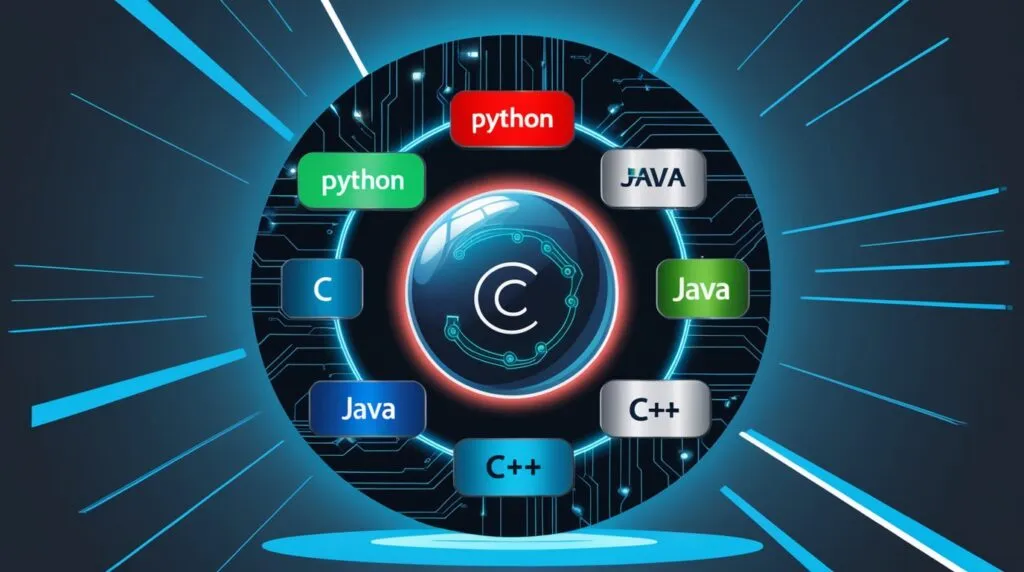
When Coding Becomes Necessary in Cybersecurity
Cybersecurity jobs need many skills, including technical skills like coding. Some jobs don’t need coding, but others do. They need coding for tasks like finding vulnerabilities and testing systems.
In some cybersecurity fields, coding requirements are clear. For example, security analysts and incident response teams must know coding. They use this knowledge to handle security issues. Also, those in security architecture and penetration testing need coding to build and test secure systems.
Some key areas where coding is key in cybersecurity are:
- Malware analysis: needs coding to understand malware
- Vulnerability assessment: requires coding to find and exploit vulnerabilities
• Penetration testing: requires coding to mimic attacks in order to assess security
As cybersecurity grows, the need for skilled professionals with technical skills increases. To do well in cybersecurity, it’s crucial to have a solid coding base. Another common and unnoticed ways is to follow new technologies and trends.
Learning Resources for Aspiring Cybersecurity Professionals
Aspiring cybersecurity professionals have many learning resources. They can choose from online courses, bootcamps, certifications, and practice platforms. Each option helps in developing skills and knowledge.
Online Courses and Bootcamps
Online courses and bootcamps provide a structured approach to learning. It gives you everything right from the ABCs of cyber security to the complex methods of the same. Some of the most famous ones are on Coursera, Udemy, and Cybrary.
Recommended Certifications
Certifications show expertise and knowledge in cybersecurity. Better certification to go for are: CompTIA Security+ , CISSP, and CEH. They assist the representatives of certain professions to make themselves visible and demonstrate their passion.
Practice Platforms
Practice platforms offer hands-on learning. They let users practice in a safe environment. Real-world scenarios and tools are used. Hack The Box, TryHackMe, and Cybrary Virtual Labs are popular.
Using these resources, aspiring cybersecurity professionals can develop the skills needed. This field is exciting and rewarding.

Real-World Examples of Coding in Cybersecurity
IT coding work is important in cyber security for activities such as threat assessment and event management. Businesses apply coding to prevent or downgrade cyber incidents. For example, Google protects its users’ data and fights phishing with coding.
Some examples of coding in cybersecurity include:
- Developing algorithms to detect and prevent malware
- Creating scripts to automate security tasks
- Building programs to analyze network traffic and find possible threats
Coding in cybersecurity goes beyond these examples. It’s used in networksecurity, cloud security, and endpoint security. By looking at real-world examples, cybersecurity experts can learn to solve problems and protect against threats.
Real-world examples and case studies offer insights into coding in cybersecurity. They help cybersecurity professionals grow their skills and apply them in real situations.
| Company | Example of Coding in Cybersecurity |
| Using coding to prevent phishing attacks | |
| Microsoft | Developing algorithms to detect and prevent malware |
Career Progression and improvement of skills
Cybersecurity offers many chances for career growth and skill improvement. As people gain experience, they move from junior to senior roles. This move is key for career growth, allowing for skill and expertise development.
Specialization areas like incident response, penetration testing, and security architecture are important. These areas help professionals become experts, making them more valuable. Many companies provide training and development programs, like certification courses and workshops.
Certifications like CompTIA Security+ and CISSP are popular. They help professionals grow their careers. Besides formal training, continuous learning is also important. This keeps professionals updated with new threats and technologies.
There are many specialization options in cybersecurity. Professionals can focus on cloud security, artificial intelligence, or IoT security. Developing specialized skills boosts earning potential and career advancement. Investing in skills and knowledge is crucial for success in cybersecurity.
| Certification | Description |
| CompTIA Security+ | Entry-level certification covering security fundamentals |
| CISSP | Advanced certification covering security management and architecture |
Conclusion: Building Your Path in Cybersecurity
Coding plays a big role in cybersecurity, offering many career paths. Whether you’re a seasoned programmer or new to the field, there’s a place for you. You can build a successful cybersecurity career in many ways.
It’s important to learn about security, networking, and how to analyze problems. These skills are key, even if you’re not a coder. Add to your knowledge with certification and real-world experience. Cybersecurity changes fast, so keep learning about new trends and tech.
Boost your skills in coding or other areas to make your mark in cybersecurity. There are many chances to grow and succeed. With hard work and a smart plan, you can reach your goals in this exciting field.
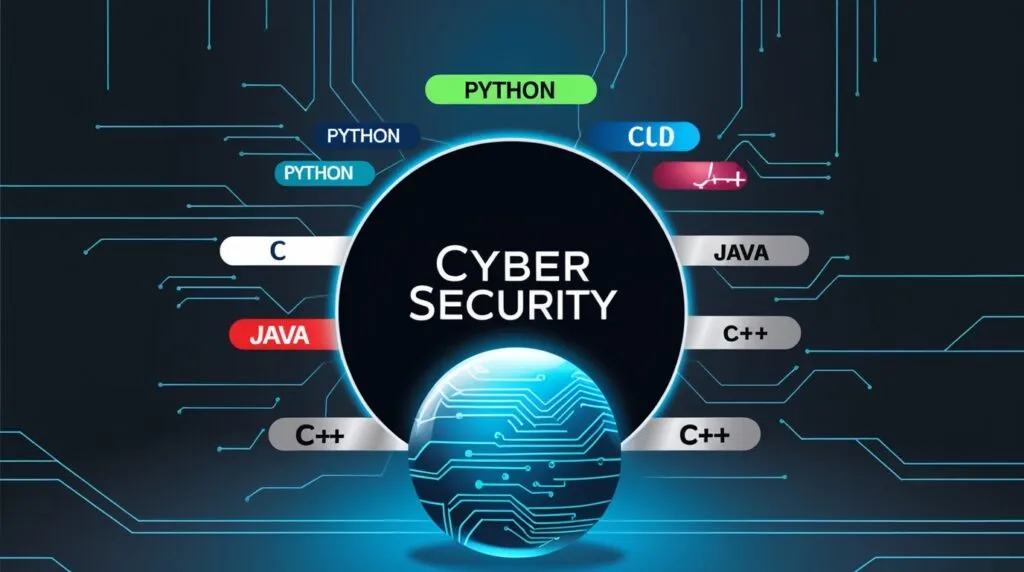
FAQ
What is cybersecurity?
Cybersecurity protects systems, networks, and programs from digital threats. It uses strategies, tools, and techniques to keep digital information safe. This includes making sure information stays private, is not tampered with, and is accessible when needed.
What are the key areas of cybersecurity work?
Key areas include security analysis, penetration testing, and security architecture. These roles need both technical and non-technical skills. They help identify and handle security threats.
Is coding required for a career in cybersecurity?
Coding needs vary by role and organization in cybersecurity. Some jobs require coding skills, while others focus on non-technical skills. Skills like analytical thinking and network knowledge are also important.
What are the essential programming languages used in cybersecurity?
Essential languages include Python, Java, C++, and Bash. These are used for scripting, automation, and analyzing vulnerabilities.
What non-coding skills are crucial in cybersecurity?
Non-coding skills like analytical thinking and network knowledge are key. Understanding security concepts and principles is also crucial. These skills help professionals identify and solve security threats.
How can someone start a cybersecurity career without coding experience?
Starting without coding experience is possible. Entry-level jobs like security analyst or incident response specialist often don’t require coding. Getting certifications and gaining experience through internships or volunteer work can also help.
When does coding become necessary in cybersecurity?
Coding is needed for tasks that require tool development or customization. This includes roles like penetration testing and security architecture. Coding skills are essential for automating tasks and analyzing data.
What are some real-world examples of coding in cybersecurity?
Cybersecurity experts use coding for many tasks. They scan for vulnerabilities and automate incident responses. They also create custom security tools and analyze network traffic. These examples highlight the importance of coding in cybersecurity.
What are the opportunities for career progression and skill development in cybersecurity?
Career progression in cybersecurity is possible through skill development. Moving up involves gaining specialized skills. There are many ways to develop these skills, like certifications, training programs, and hands-on experience. MORE


